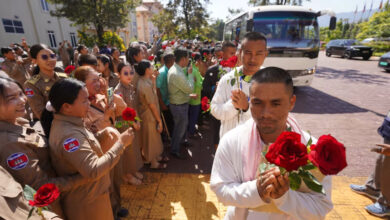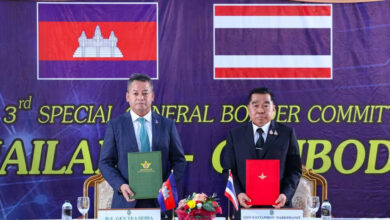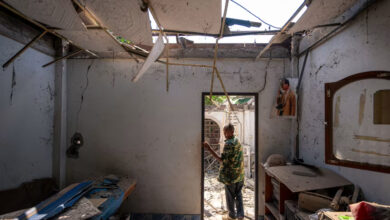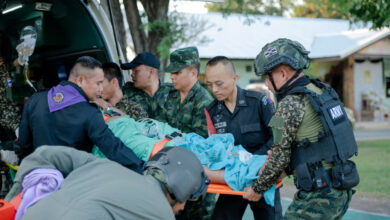Anti-government protesters in Thailand pinned their hopes on winning support from the powerful security forces on Thursday as they push to oust Prime Minister Yingluck Shinawatra and install an unelected administration.
A small group of protesters scaled the walls into the grounds of Yingluck's Government House office on Thursday. They left without confronting police stationed there but said they wanted the officers to leave.
Protest leader Suthep Thaugsuban, a former deputy premier accused of murder during 2010 protests, has asked police and military chiefs to meet him by Thursday evening and to choose their side in the latest crisis engulfing Southeast Asia's second-biggest economy.
The politically powerful army has staged or attempted 18 coups in the past 80 years, including the ousting of Yingluck's brother, Thaksin Shinawatra, in 2006. It has said it does not want to get involved this time but may mediate.
The eight-year, on-and-off political conflict centers on Thaksin, a former telecommunications tycoon popular among the rural poor. The protesters view Yingluck as his puppet.
Thaksin, who lives in self-imposed exile, courted rural voters to win back-to-back elections in 2001 and 2005 and gain an unassailable mandate that he used to advance the interests of major companies, including his own.
He was convicted in absentia of graft in 2008 but has dismissed the charges as politically motivated.
His opponents are Thailand's royalist elite and establishment who feel threatened by his rise. Trade unions and academics see him as a corrupt rights abuser, while the urban middle class resent what they see as their taxes being used as his political war chest.
On Monday, Yingluck was forced to call an early election for February 2 as 160,000 protesters massed around her office.
The numbers on the street have dwindled considerably since then. A Reuters reporter said most of those who scaled the Government House walls on Thursday left after razor-wire barricades in the compound were moved aside.
Protest leaders said they would cut water and power to the premises if police did not withdraw. A Reuters reporter saw some power lines being cut.
Riot police held their positions during the incursion without confronting the protesters.
“Last night protesters tried to cut electricity at Government House and fired slingshots at police on duty,” police spokesman Piya Utayo said later in a televised statement.
“Some protesters and a third party have tried to escalate the situation,” he said, without elaborating.
A police officer on the premises, who declined to give his name because he was not authorized to speak to the media, said several small, crude explosives described as “ping pong bombs” had been thrown into the grounds on Thursday. No one was hurt.
He said police had been ordered to stay and protect the building but to avoid clashes with the protesters.
INVESTMENT RISK
Moody's Investors Service, a rating agency, said in a note the crisis was negative for Thailand's sovereign rating.
“Prolonged protests will weigh on an already fragile growth outlook for 2014,” it said.
“In addition, heightened political tensions have marred investor confidence, as reflected in the accelerated decline in Thailand's official foreign exchange position since late October,” it said. Foreign reserves fell to $167.5 billion on November 29 from $173.3 billion on October 25.
The protesters have rejected the early election. They want an unelected “people's council” to run Thailand and say Yingluck and her ministers should step down. She is caretaker prime minister until the election.
“If a plane crashed with the whole cabinet in it and they all died, Thailand would still go on,” protest leader Suthep told supporters late on Wednesday.
Thaksin's supporters have said they would weigh in to defend Yingluck if Suthep appeared poised to overthrow her. On Wednesday, Jatuporn Promphan, a leader of a pro-Thaksin movement, promised to mobilize crowds that would dwarf the recent anti-government protests.
Thaksin's “red shirt” supporters brought central Bangkok to a halt in April and May 2010 in protests aimed at forcing then Prime Minister Abhisit Vejjajiva to call early elections.
That protest was put down by the military. More than 90 people, mostly Thaksin supporters, were killed over the period.
Abhisit and Suthep, a deputy prime minister to Abhisit, have been accused of murder related to those events.
Abhisit was formally charged with murder at Bangkok's criminal court on Thursday and granted bail. The next hearing was set for March 24, 2014, but the case could drag on for months, or even years. Suthep did not turn up.
Suthep's campaign to oust Yingluck has been strong on rhetoric but has failed to stop the government functioning.
Missed deadlines for Yingluck to resign have become the norm for a protest movement that has openly courted anarchy on Bangkok streets in the hope of inducing a military coup or judicial intervention.
Suthep's sometimes bewildering statements have included a call for police to arrest Yingluck for treason, an order for civil servants and security forces to report to him instead of the government and for citizen “peacekeeping forces” to take over from police.




